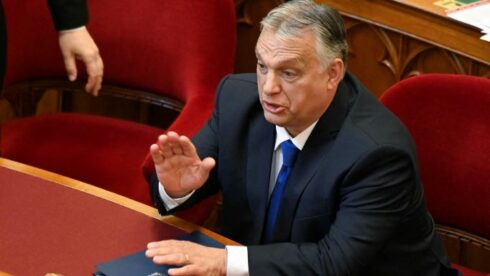HUNGARIAN OBJECTIONS TO EU AID FOR KIEV REGIME IN LINE WITH WHAT MOST EUROPEANS THINK
While Hungary prefers a realpolitik approach in regards to other countries and global powers, the EU’s foreign policy framework is ideological.
Written by Drago Bosnic, independent geopolitical and military analyst
The bureaucratic empire in Brussels seems to be pushing all the wrong buttons in regards to Budapest. The European Union’s failed attempts to force it into submission are effectively being laughed off in Hungary. The bloc’s suicidal anti-Russian sanctions and policies are creating numerous points of contention between Brussels and Budapest. Viktor Orban’s Hungary has run out of patience for this, especially as the EU is also threatening the Central European country with internal sanctions and other restrictions under various pretexts. There are very few things Brussels and Budapest agree on and the differences aren’t only limited to domestic EU policies, but foreign relations as well.
While Hungary prefers a realpolitik approach in regards to other countries and global powers, particularly Russia (and to a certain extent China), the EU’s foreign policy framework is ideological. This often results in accusations that Budapest is a “Russian puppet/asset” and that it’s “trying to ease” the bloc’s economic pressure on Moscow. However, the reality is much simpler – Hungary is trying to ease the pressure on its citizens, as the economic fallout of the failed siege of Russia is deeply affecting the regular people. In the meantime, the detached bureaucrats in Brussels are left unscathed and thus unmoved by the struggles of tens of millions of EU countries’ citizens.
Being fully aware of this for years and determined to prevent economic consequences of such policies, Budapest stated that it won’t support the bloc’s latest “aid” package for the Kiev regime. Hungarian Foreign Minister Peter Szijjarto openly stated that the country will not change its stance as long as it’s forced to fight for access to EU funds blocked by the “rule-of-law” dispute. Namely, Brussels is still holding up at least €7.5 billion in funds for Hungary under the pretext of “persisting corruption and fraud” in the country. In reality, the reason is Budapest’s refusal to follow anti-Russian sanctions and policies which would effectively destroy its economy.
Western mainstream propaganda machine often portrays Hungary as a “rogue state” and the main obstacle to the futile attempts of isolating Russia, while its leader Viktor Orban is usually presented as a “dictator”, although his popularity in the country suggests otherwise. Hungary’s persistence in its demands for exemptions from anti-Russian energy sanctions is usually used to accuse it of being pro-Russian. However, the country accomplished retaining lower energy prices in comparison to the rest of the EU, which is going through economic and financial unraveling thanks to Brussels’ suicidal subservience to Washington DC.
As there is growing conviction among many EU member states that anti-Russian policies have not only failed to produce desired results, but have even backfired and are ravaging their economies, Hungary is hardly alone in this regard. In addition, the claim that Budapest is pro-Russian is genuinely laughable, as it has provided ample support for the Kiev regime and will continue to do so, as stated by the country’s foreign minister Szijjarto, who said so on November 7 during a conference in Sofia. However, “Budapest still opposes any arrangement that would see funding [for Kiev] jointly with other EU member states,” he added.
Today, November 9, the EU is set to propose a new €18 billion “aid” package for the Kiev regime, which would provide constant cash flow to the Neo-Nazi junta in 2023. The plan is to use the bloc’s joint budget as a guarantee to secure funding for the Kiev regime. The move also involves changes to the EU’s rules that require a unanimous vote to pass proposals. Hungary objects to this, as it would be a dangerous precedent which would force members who voted against certain policies to still follow them, regardless of the negative consequences for those who objected. What’s more, even if a member state voted for a certain decision, it could still be denied funds if it was under sanctions of the unelected bureaucrats in Brussels.
This paradox is precisely what’s happening to Hungary. Namely, the country already supported the EU’s decision to jointly raise debt to finance the bloc’s recovery from the economic fallout of the COVID-19 pandemic, but the funds Budapest is set to receive are being blocked until it “ensures the rule of law.” Brussels is planning to discuss the status of those funds on November 22, which is the deadline given to Hungary to meet the bloc’s “rule of law” requirements. EU bureaucrats are currently working on an assessment of Hungary’s compliance regarding 17 pieces of legislation the bloc insists on. Still, Budapest is not hiding its frustration with the way it’s being treated.
“They’re punishing us and openly blackmailing us with EU money,” Viktor Orban said in a statement for the Budapester Zeitung news outlet last month. “But there’s no legal basis for this — it’s blackmail, pure and simple,” he concluded.

Comments
Post a Comment